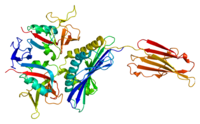
Photo from wikipedia
BackgroundThe development of memory responses is an evolutionary function of the adaptive immune system. We propose that for the immune system to populate the memory compartment with the best-suited CD8… Click to show full abstract
BackgroundThe development of memory responses is an evolutionary function of the adaptive immune system. We propose that for the immune system to populate the memory compartment with the best-suited CD8 T cells it utilizes a process of certification or molecular accreditation mediated through Natural Killer Group 2D (NKG2D). This process of certification assures that the memory compartment is filled with CD8 T cells that have demonstrated their ability to kill their cognate targets through a two-step process that utilizes T cell receptor (TCR) and NKG2D signaling.MethodsOne week after immunization with peptide-pulsed dendritic cells, NKG2D signaling was transiently blocked in vivo with a single injection of neutralizing antibodies. Under such conditions, we determined the importance of NKG2D signaling during the effector phase for memory formation without compromising NKG2D signaling at the memory phase. Both open (polyclonal) and closed (monoclonal) CD8 T cell repertoires were studied.ResultsWe show that signaling through NKG2D mediated this certification. Temporary blockade of NKG2D signaling during the effector phase resulted in the formation of highly defective memory CD8 T cells characterized by altered expression of the ribosomal protein S6 and epigenetic modifiers, suggesting modifications in the T cell translational machinery and epigenetic programming. Finally, these uncertified memory cells were not protective against a B16 tumor challenge.ConclusionSignaling through NKG2D during the effector phase (certification) favors the development of functional memory CD8 T cells, a previously undescribed role for NKG2D. Temporary blockade of NKG2D signaling during the effector phase results in the formation of highly defective memory CD8 T cells potentially by affecting the expression of the ribosomal protein S6 and epigenetic modifiers, suggesting alterations in T cell translational machinery and epigenetic programming.
Journal Title: Journal for Immunotherapy of Cancer
Year Published: 2019
Link to full text (if available)
Share on Social Media: Sign Up to like & get
recommendations!